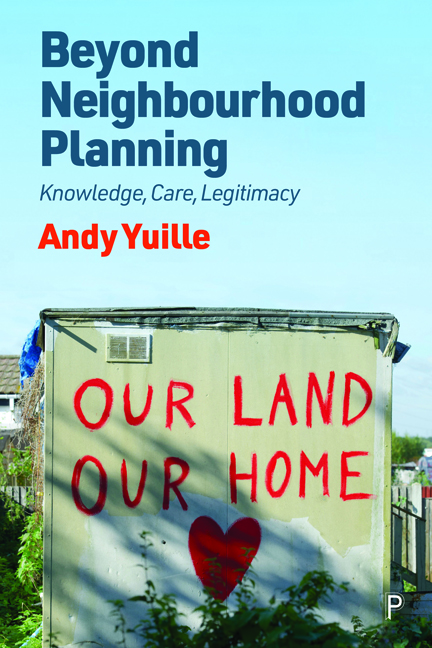Book contents
- Frontmatter
- Contents
- List of figures and table
- Acknowledgements
- Preface
- 1 Introduction: Neighbourhood planners and the turn to participation
- 2 Planning, participation and democratisation
- 3 Knowledge, politics and care: perspectives from Science and Technology Studies
- 4 Neighbourhoods, identity and legitimacy
- 5 Experience, evidence and examination
- 6 Expertise, agency and power
- 7 Care and concern
- 8 Conclusion: Neighbourhood planning and beyond
- Notes
- References
- Index
2 - Planning, participation and democratisation
Published online by Cambridge University Press: 20 January 2024
- Frontmatter
- Contents
- List of figures and table
- Acknowledgements
- Preface
- 1 Introduction: Neighbourhood planners and the turn to participation
- 2 Planning, participation and democratisation
- 3 Knowledge, politics and care: perspectives from Science and Technology Studies
- 4 Neighbourhoods, identity and legitimacy
- 5 Experience, evidence and examination
- 6 Expertise, agency and power
- 7 Care and concern
- 8 Conclusion: Neighbourhood planning and beyond
- Notes
- References
- Index
Summary
The problem with the current planning system is that it is not seen to be fair to local communities. It seeks to drown out their voices rather than to amplify them. Despite the clear wishes of local communities and local councils, the local view is that developers eventually ram through inappropriate developments on appeal … pitting local residents against the might and resources of developers.
Alok Sharma MP (Hansard, 2011)Introduction
In this chapter I introduce neighbourhood planning in more detail. I sketch out how the English land use planning system is intended to function regarding public participation in decision making. I then highlight some criticisms of the system, contrasting the participatory ideal with people's experience in practice, as exemplified by the opening quotation. Alok Sharma, the speaker, was at the time a Conservative MP and had been Minister for Housing and Planning in 2017– 2018. This quotation is from a debate in the House of Commons on the Localism Bill, the legislation that brought neighbourhood planning into being, and exemplifies the rationales given for the introduction of neighbourhood planning. I then set out some of the reforms introduced by the Conservative– Liberal Democrat Coalition government of 2010– 2015, which, in part at least, were intended to address these criticisms. Prominent among these reforms was the introduction of neighbourhood planning. I provide an overview of the requirements for preparing a neighbourhood plan, and some of the key aspects of the wider suite of reforms introduced at the same time, in relation to how they affect the abilities of the public to participate meaningfully in the system.
I then go on to situate neighbourhood planning in relation to the wider turns to participation and localism. I explore how it is subject to criticisms levelled at participatory and localist initiatives more widely, while also recognising a counter-current to this critique which suggests that it does introduce potential for real progressive change. I note that neighbourhood planning looks set to remain a significant part of the English planning system for the foreseeable future.
- Type
- Chapter
- Information
- Beyond Neighbourhood PlanningKnowledge, Care, Legitimacy, pp. 28 - 60Publisher: Bristol University PressPrint publication year: 2023

